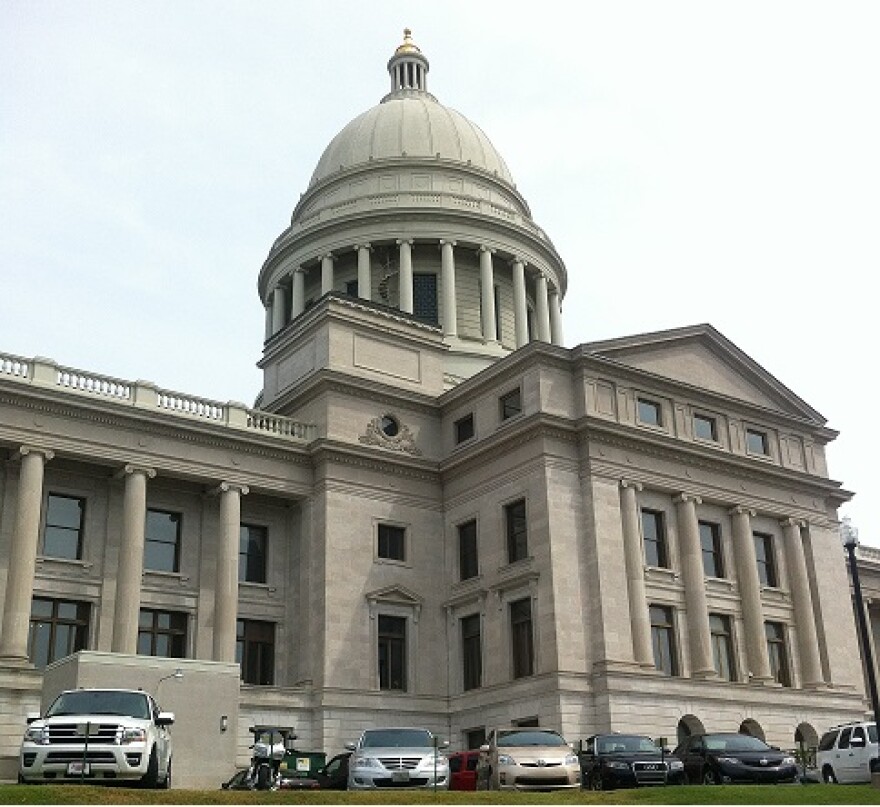The Arkansas Senate spent its first day of the special session debating and not passing an amendment to a bill that establishes a COVID-19 rainy day fund for the state.
Speaking to a spread-out Senate on Thursday, Senate President Pro-Tempore Jim Hendren, R-Gravette, proposed Senate Bill 2, which would establish the COVID-19 Rainy Day Fund. According to the bill, it would consist of funds transferred from the General Revenue Allotment Reserve Fund, revenues provided by law, or any fund or fund account transfers provided for by the law.
The bill also changes whose approval is needed for the release of any money from the fund. That list includes: The Speaker of the House, the President Pro Tempore of the Senate and the majority and minority leaders of both chambers. It allows for the designation of proxies if needed.
Hendren said in regular emergency circumstances, approval would only be needed by the chairs of the Arkansas Legislative Council. After hearing feedback from other legislators, they decided to change the criteria to the now proposed list. However, while adding more members does increase input, Hendren said it also adds to the number of people who must respond.
"Some of these decisions literally may save lives if they’re not made in a matter of hours. And the ability to find six members now versus me or the speaker necessitated that there be some more flexibility given to make sure that if I could not a hold of two of the other people and I needed one of their votes or the same thing on the House, there’d be a methodology for that to occur," Hendren said.
That methodology includes giving the majority and minority leaders two hours to respond to a request for funding, followed by giving said voting power to the approved designee. If the designee is not available, the vote is an automatic yes.
Sen. Jimmy Hickey, R-Texarkana, introducedan amendment that would have changed who would approve of funding requests. The amendment instead placed approval power with the Performance Evaluation and Expenditure Review subcommittee of the Legislative Council along with the Speaker of the House and the Senate President Pro-Tempore.
Sen. Trent Garner, R-El Dorado, spoke in favor of the amendment, saying it would give him a greater opportunity to provide input on where to move the emergency funds.
"I have no voice with that first bill. The people I represent, the dozens of phone calls I’ve taken daily, that many of you in this room have, people who are asking me to take charge and make a difference on this. I have zero voice in that process as an elected official," Garner said.
After almost an hour of debate, the Senate ultimately did not pass the amendment with a vote of 13-17. The Senate will reconvene today at 3 p.m. for the second day of the special session and is expected to advance the bill.
Meanwhile, members of the Arkansas House of Representatives, seated far apart from each other in the bleachers at UA Little Rock’s Jack Stephens Center, voted Thursday to advance a bill that creates the COVID-19 Rainy Day Fund, the same bill the Senate is considering. It allow the governor to address an anticipated $353 million budget shortfall.
Representative Stephen Meeks, R-Greenbrier,asked about the transparency of the COVID-19 Rainy Day Fund.
"A question I had from a constituent. According to the bill, any expenditures out of this fund, there has to be a report sent to members of the General Assembly. Will that report also be made available to the public so the public can see what we’re doing with this fund and if so, do we know where that would be posted?" Meeks said.
Arkansas Speaker of the House Matthew Shepherd, R-El Dorado, said any requests on the state’s fund would be made available to the entire General Assembly and the public. A similar fund at the federal level was opposed earlier this week because it would have allowed the Trump Administration to distribute funds without disclosing the recipients for six months.
Both chambers will reconvene today at 3 p.m. for the second day of the session.






